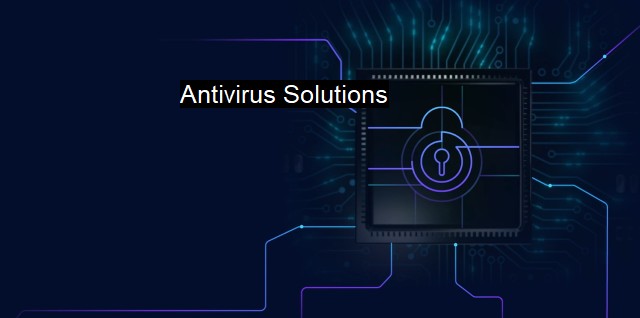What are Antivirus Solutions?
The Importance of Antivirus Software in Cybersecurity: Protecting your Digital Life from Viruses, Malware, and Cyber Threats.
Antivirus solutions are influential components playing a critical role in safeguarding information technology systems and networks against malicious threats. This term, often interchanged with antivirus software, refers to an array of detection, defense, and remedial programs explicitly designed to thwart viruses and other malicious software.To fully comprehend the scope of antivirus solutions, it is essential to understand what viruses signify within the context of cybersecurity. In computer language, a virus is a type of malicious software, commonly known as malware, capable of replicating itself onto other programs, files, or computers, often without the user's consent. A virus primarily aims to destabilize a system, alter functionalities, or pilfer sensitive data. This agenda resonates broadly with other malware: trojans, ransomware, worms, adware, and more.
Antivirus solutions come into play to combat the threat represented by viruses and the myriad other forms of malware. Their principal objective includes detecting unanticipated malicious activities and implementing necessary operational safeguards to protect computer systems. antivirus programs are designed to repair any system damages caused by malware, maintaining maximum cybersecurity.
Most antivirus software identifies viruses by scanning files or directories and comparing the data against a database of known malware signatures. The software also uses advanced, heuristic analysis to flag potential threats that might not be available in the existing virus definitions database.
The evolution of technology has rendered the operation of these malicious entities more sophisticated, prompting antivirus solutions to transcend beyond their traditional roles to acclimate themselves in a dynamic cyber world. Updated antivirus solutions now employ advanced methods, such as behavior-based detection and real-time scanning to ensure comprehensive protection. Behavioral-based detection focuses more on identifying unusual behavior, such as random file modifications rather than relying entirely on known virus signatures.
Similarly, real-time scanning refers to a continuous monitoring technique that offers instant, automated, and default protection against any attack. The antivirus typically operates in the background, scanning every memory and file when loaded into the system to ensure no malware is smuggled into a safe environment.
Another trend incorporated in modern antivirus solutions includes sandbox testing, which opens potential malware in a protected, virtual environment to analyze it without risking the device's safety. This precautionary method helps decipher unknown or zero-day malware's behavior and anatomy, thus aiding in their early detection and prevention.
Equally critical is understanding that antivirus solutions are not the absolute bulwark against cyber threats but crucial elements in a broader cybersecurity strategy. While they present significant protection against a wide variety of threats, some sophisticated malware types might manage to bypass these defenses. Consequently, combining antivirus solutions with other deterrence strategies, such as firewalls, intrusion detection systems, spam filters, and secure browsing tools, alongside user cybersecurity awareness, helps consolidate a nuanced, multi-layered security posture.
Antivirus solutions encompass an extensive assortment of systems and practices to mitigate the online threats posed by viruses and malicious software in the digital realm predominantly besieged by technological complexities. Their operation builds on detecting probable threats, responding instantly to an unauthorized activity, and fortifying system restoration to safeguard the cybersecurity domain. Modern antivirus solutions leverage advanced features like real-time scanning, behavior-based detection, and sandbox testing, offering a more robust defensive system. it is essential to complement them with other components of computer security and safe browsing practices for more robust protection.

Antivirus Solutions FAQs
What is an antivirus solution?
An antivirus solution is a software program designed to detect, prevent, and remove malicious software or viruses from a computer system. It provides protection against various cybersecurity threats such as malware, adware, spyware, Trojans, and phishing attacks.Do I really need an antivirus solution?
Yes, you need an antivirus solution to protect your computer from various cybersecurity threats. Without an antivirus solution, your computer can be vulnerable to malware infections, which can lead to data theft, financial loss, and other serious issues. An antivirus solution provides a layer of protection against these threats and helps keep your computer safe from harm.How do antivirus solutions detect and remove viruses?
Antivirus solutions use a combination of techniques to detect and remove viruses. These techniques include signature-based detection, heuristics, and behavioral analysis. Signature-based detection involves identifying specific patterns in the code of a virus or malware. Heuristics involves analyzing code behavior and identifying potential threats based on that behavior. Behavioral analysis involves monitoring system behavior to identify possible threats. Once a virus or malware is detected, the antivirus solution will take actions such as quarantine or deletion to remove it from the system.Which antivirus solution is the best?
There are many antivirus solutions available in the market, and choosing the best one depends on your specific needs. Some popular antivirus solutions include Norton, McAfee, Kaspersky, Bitdefender, Avast, and AVG. When choosing an antivirus solution, consider factors such as price, features, ease of use, and customer support. It is recommended to use a reputable and established antivirus solution that is regularly updated to provide the best protection against the latest threats.| | A | | | B | | | C | | | D | | | E | | | F | | | G | | | H | | | I | | | J | | | K | | | L | | | M | |
| | N | | | O | | | P | | | Q | | | R | | | S | | | T | | | U | | | V | | | W | | | X | | | Y | | | Z | |
| | 1 | | | 2 | | | 3 | | | 4 | | | 7 | | | 8 | | |||||||